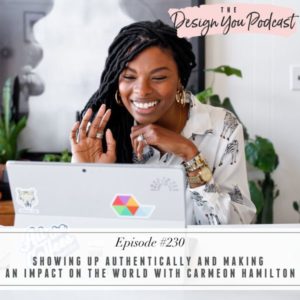
Nothing inspires me more than people who are willing to do things differently, go their own way, and make their business exactly what they want it to be. And I am so excited to bring you this week’s guest who is here to inspire you to create a business that is meant for you.
Carmeon Hamilton is a Memphis-based Interior Designer, Content Creator, and winner of HGTV’s Design Star: Next Gen. She now has her own show, Reno My Rental, and has been living life in the public eye for the last two years, something she states has been pretty transformational. Carmeon is a proponent of doing what’s best for you, no matter what it is, and is here to share some of the amazing things she’s doing in her work.
Join us this week as we’re inspiring you to think differently about your business, and diving deeper into showing up authentically and using your platforms and your voice in a way that is aligned with who you are. Hear the big shifts Carmeon has been making in her career to become more aligned with her values, and some of the exciting places she’ll be investing her energy into moving forward.





